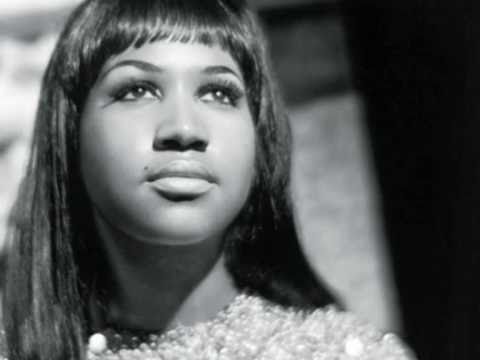I’ve written about Aretha before in this column, three times in regard to her own records and many more times in passing while writing about another artist. There’s virtually nothing that I can add to the extensive coverage that we’ve all been following since Aretha died. We’ve heard all about her childhood from her birth in Memphis to her family’s move to Buffalo when she was two to her permanent relocation to Detroit. We know that Aretha was the daughter of the prominent minister C.L. Franklin, that he separated from his wife when Aretha was six-years-old, and that her mother died four years later.
It wasn’t long after her mother’s death that Aretha began to sing in her father’s New Bethel Baptist Church. The first hymn she sang, at age 12, was “Jesus, Be a Fence Around Me.” Her reputation as a gospel singer continued to grow until Aretha reached the age of 16. At that point, she began to contemplate a move to secular music with encouragement from Sam Cooke who had followed the same path.
There were several offers from record labels and eventually Aretha signed with Columbia Records and released her first secular album in 1961. She made some fine albums for Columbia but the truth is that the label failed to take advantage of her strengths and when her contract expired in 1966, Aretha moved on to Atlantic Records. One day at FAME Studios in Muscle Shoals in January 1967 was all it took to cement her place in history. The song that was recorded in Muscle Shoals, “”I Never Loved a Man (The Way I Love You),” was Aretha’s first Top 10 hit and was followed up by her take on Otis Redding’s “Respect” which took her to the top of the charts and became her signature song. “Respect” was followed by “(You Make Me Feel Like) A Natural Woman” and “Chain of Fools.” Not a bad run, right? And it was far from over.

There were more hits, many more hits over the years. While Aretha had her greatest string of hits in the 1960s, she was still creating hits into the 1980s and beyond. Her classics for Atlantic and Arista are too numerous to mention and besides, you know them all. So I’ll focus on one hit in particular, Aretha’s take on the Burt Bacharach and Hal David song “I Say a Little Prayer.”
The song was originally written by Bacharach and David for Dionne Warwick with whom they had so many hits. Her version was another in that run, reaching #4 on the Billboard Hot 100 at the end of 1967. Despite the success, Bacharach himself was never happy with the finished record, feeling that it was too rushed.
The following year, Aretha and her background vocalists, the Sweet Inspirations, were rehearsing songs for the upcoming Aretha Now album and they began singing “I Say a Little Prayer” just for fun. It wasn’t long before they realized that their version, markedly different from Warwick’s, had potential. In July 1968, “I Say a Little Prayer” was released as the B-side of “The House That Jack Built” but before long it was getting airplay on its own. By October 1968 the B-side was a Top 10 hit on the pop and R&B charts. It was Aretha’s ninth consecutive Top 10 hit for Atlantic and it would be her last for the label.
Aretha Franklin’s music was important to generation after generation. Even more important was her commitment to civil rights and women’s rights. “Respect” and “Natural Woman” became anthems for those causes and she provided her time and money for the struggle from behind the scenes and on stage at various benefits over the years.
It’s hard to imagine a world without Aretha Franklin. She was one of those rare artists who remained our hearts and in our ears for decades. Even after all of this time, no one changes the channel when “Respect” comes on the radio. We’re more likely to start singing along at the top of our lungs with huge smiles on our faces. The Queen is gone but in truth, she will never really be gone at all. Long live the Queen.
